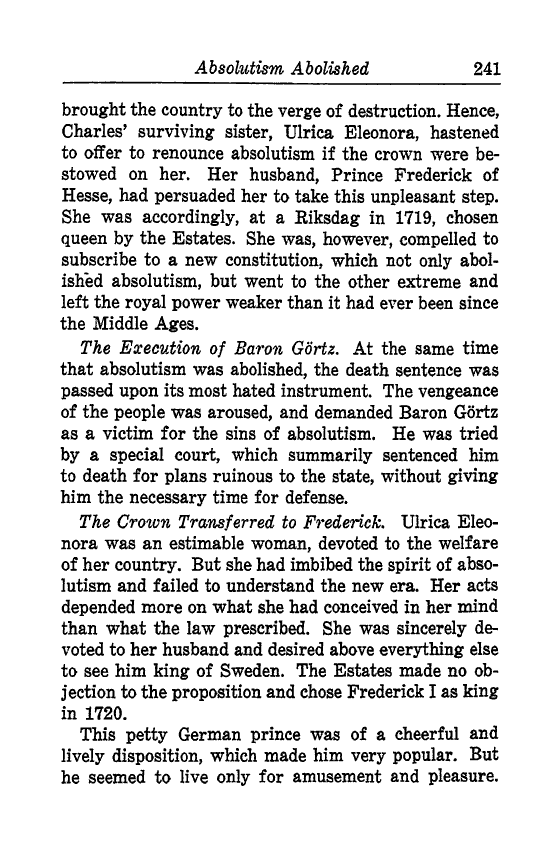
Full resolution (TIFF) - On this page / på denna sida - XIV. Reign of Ulrica Eleonora and Frederick I, 1719–1751 - A. Introduction

<< prev. page << föreg. sida << >> nästa sida >> next page >>
Below is the raw OCR text
from the above scanned image.
Do you see an error? Proofread the page now!
Här nedan syns maskintolkade texten från faksimilbilden ovan.
Ser du något fel? Korrekturläs sidan nu!
This page has never been proofread. / Denna sida har aldrig korrekturlästs.
Absolutism Abolished 241
brought the country to the verge of destruction. Hence,
Charles’ surviving sister, Ulrica Eleonora, hastened
to offer to renounce absolutism if the crown were be-
stowed on her. Her husband, Prince Frederick of
Hesse, had persuaded her to take this unpleasant step.
She was accordingly, at a Riksdag in 1719, chosen
queen by the Estates. She was, however, compelled to
subscribe to a new constitution, which not only abol-
ished absolutism, but went to the other extreme and
left the royal power weaker than it had ever been since
the Middle Ages.
The Execution of Baron Gortz. At the same time
that absolutism was abolished, the death sentence was
passed upon its most hated instrument. The vengeance
of the people was aroused, and demanded Baron Gortz
as a victim for the sins of absolutism. He was tried
by a special court, which summarily sentenced him
to death for plans ruinous to the state, without giving
him the necessary time for defense.
The Crown Transferred to Frederick. Ulrica Eleo-
nora was an estimable woman, devoted to the welfare
of her country. But she had imbibed the spirit of abso-
lutism and failed to understand the new era. Her acts
depended more on what she had conceived in her mind
than what the law prescribed. She was sincerely de-
voted to her husband and desired above everything else
to see him king of Sweden. The Estates made no ob-
jection to the proposition and chose Frederick I as king
in 1720.
This petty German prince was of a cheerful and
lively disposition, which made him very popular. But
he seemed to live only for amusement and pleasure.
<< prev. page << föreg. sida << >> nästa sida >> next page >>